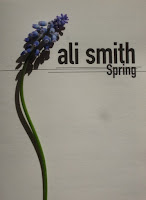Surveillance capitalists work hard to camouflage their purpose as they master the uses of instrumentarian power to shape our behavior while evading our awareness. That is why Google conceals the operations that turn us into the objects of its search and Facebook distracts us from the fact that our beloved connections are essential to the profit and power that flow from its network ubiquity and totalistic knowledge.’
Shoshana Zuboff, The Age of Surveillance Capitalism, the fight for a human future at the new frontier of power (2019;p.443)
In haar nieuwe roman, Spring (2019), schrijft Ali Smith een hoofdstuk vanuit het perspectief van een commercieel ‘sociaal medium’. Een schijnheilige, lispelende stem, die Smith, met groeiend sarcasme, almaar valser laat klinken, probeert de lezer/internetter steeds dieper het digitale graf in te lokken.
Fragmentje (p.119/120):
Fragmentje (p.119/120):
‘We want you to know we’re your best source of knowlegde in the world. We want to know everything about you. We want to know all about the places you go. We want to know where you are right know. We want you to post images of what it is you’re looking at so you will remember this special moment always. We want you to take a look at what you posted ten years ago right now. Happy Anniversary! We want to remind you regularly of the special moments you’ve had in the past. We want to show you what your friends were posting ten years ago right now. We want you to record your lives because your lives mean so much. We want you to know you mean something in the world. We want you to know how much you mean to us. We want you to know we’re very interested in what matters to you. We want you to know it matters to us too.’
Over sociale media schrijft Shoshana Zuboff dit:
‘Social media is designed to engage and hold people of all ages, but it is principally molded to the psychological structure of adolescence and emerging adulthood, when one is naturally oriented toward the ‘others’, especially toward the rewards of group recognition, acceptance, belonging, and inclusion. For many, this close tailoring, combined with the practical dependencies of social participation, turns social media into a toxic milieu. Not only does this milieu extract a heavy psychological toll, but it also threatens the course of human development for today’s young and the generations that follow, all spirits of a Christmas Yet to Come.
The hand-and-glove relationship of technology addiction was not invented at Facebook, but rather it was pioneered, tested, and perfected with outstanding succes in the gaming industry, another setting where addiction is formally recognized as a boundless source of profit.’
The Age of Surveillance Capitalism (2019;p.449)
Bij een publiekspresentatie van de baksteen die ze door de etalages van digitale tirannen heeft geslingerd, gaf Shoshana Zuboff een mini college over de nadelen van Big Tech. Aansluitend voerde ze een boeiende, volwassen conversatie met Naomi Klein: ‘Keep the data flowing’. Toptelevisie. Op het internet.
‘Poeh, wat een lange citaten! Ga ik niet allemaal lezen hoor!’
‘Klik gewoon even door naar ’t filmpje.’

